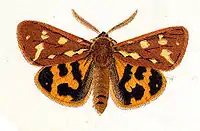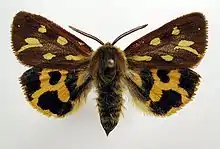Arctia aulica
Arctia aulica, the brown tiger moth, is a moth of the family Erebidae. The species was first described by Carl Linnaeus in his 1758 10th edition of Systema Naturae. It is found in the temperate areas of central Europe up to the area surrounding the Amur River to the east and up to the Balkans and the Black Sea to the south.

Illustration
| Brown tiger moth | |
|---|---|
 | |
| Scientific classification | |
| Domain: | Eukaryota |
| Kingdom: | Animalia |
| Phylum: | Arthropoda |
| Class: | Insecta |
| Order: | Lepidoptera |
| Superfamily: | Noctuoidea |
| Family: | Erebidae |
| Subfamily: | Arctiinae |
| Genus: | Arctia |
| Species: | A. aulica |
| Binomial name | |
| Arctia aulica | |
| Synonyms | |
|
Hyphoraia aulica (Linnaeus, 1758) | |
The wingspan is 34–38 mm. The moth flies from May to July depending on the location.
The larvae feed on various plants, including Achillea, Hieracium, Euphorbia, Knautia and Taraxacum species.
This species, along with the others of the genus Hyphoraia, was moved to Arctia as a result of phylogenetic research published by Rönkä et al. in 2016.[1]
References
- Rönkä, Katja; Mappes, Johanna; Kaila, Lauri; Wahlberg, Niklas (2016). "Putting Parasemia in its phylogenetic place: a molecular analysis of the subtribe Arctiina (Lepidoptera)". Systematic Entomology. 41 (4): 844–853. doi:10.1111/syen.12194.
External links
Wikimedia Commons has media related to Hyphoraia aulica.
Wikispecies has information related to Arctia aulica.
This article is issued from Wikipedia. The text is licensed under Creative Commons - Attribution - Sharealike. Additional terms may apply for the media files.